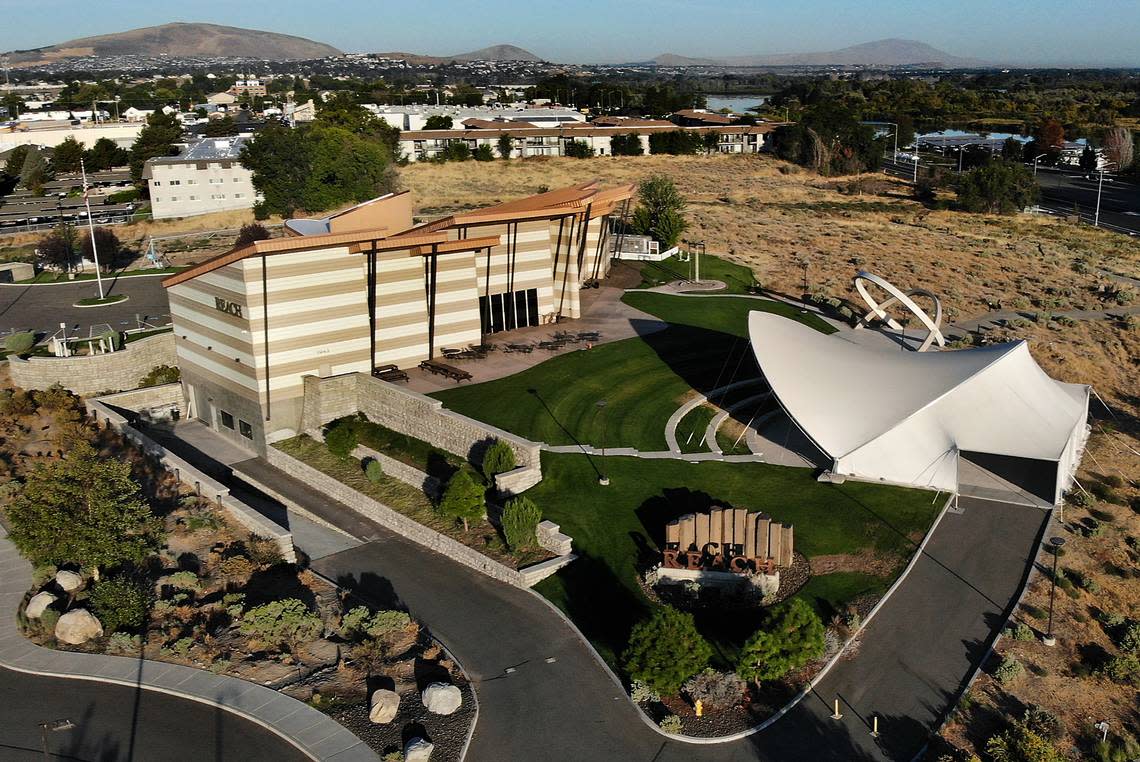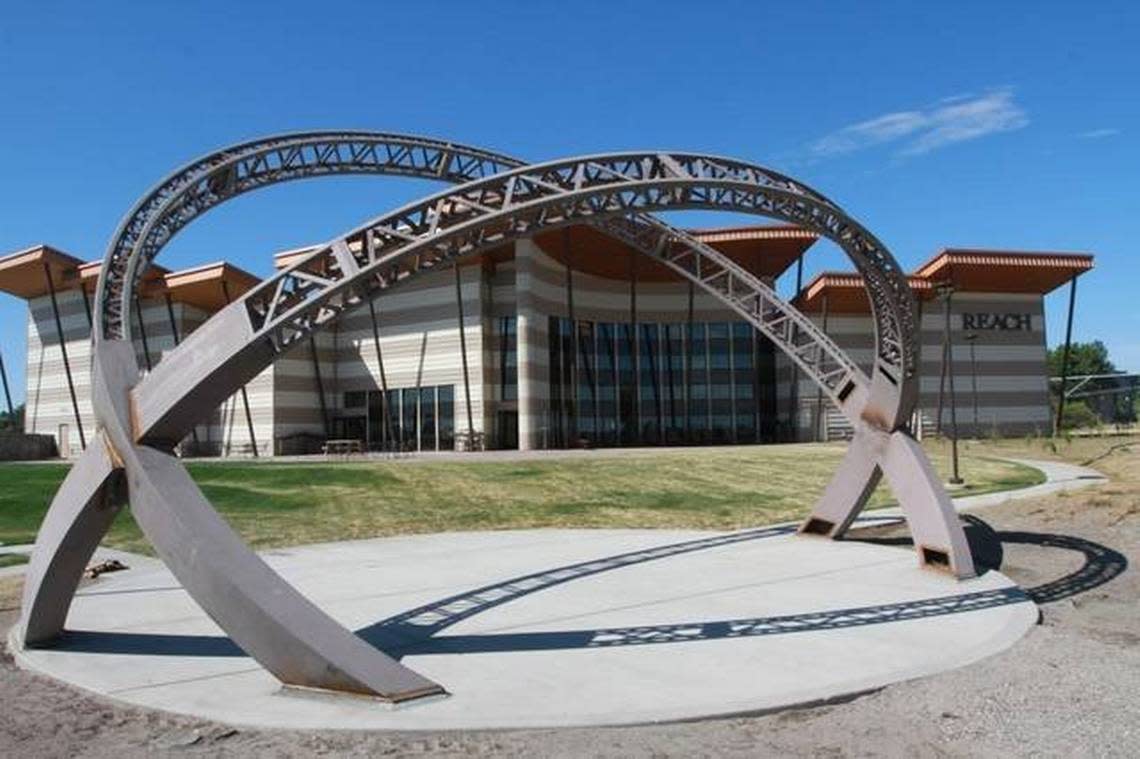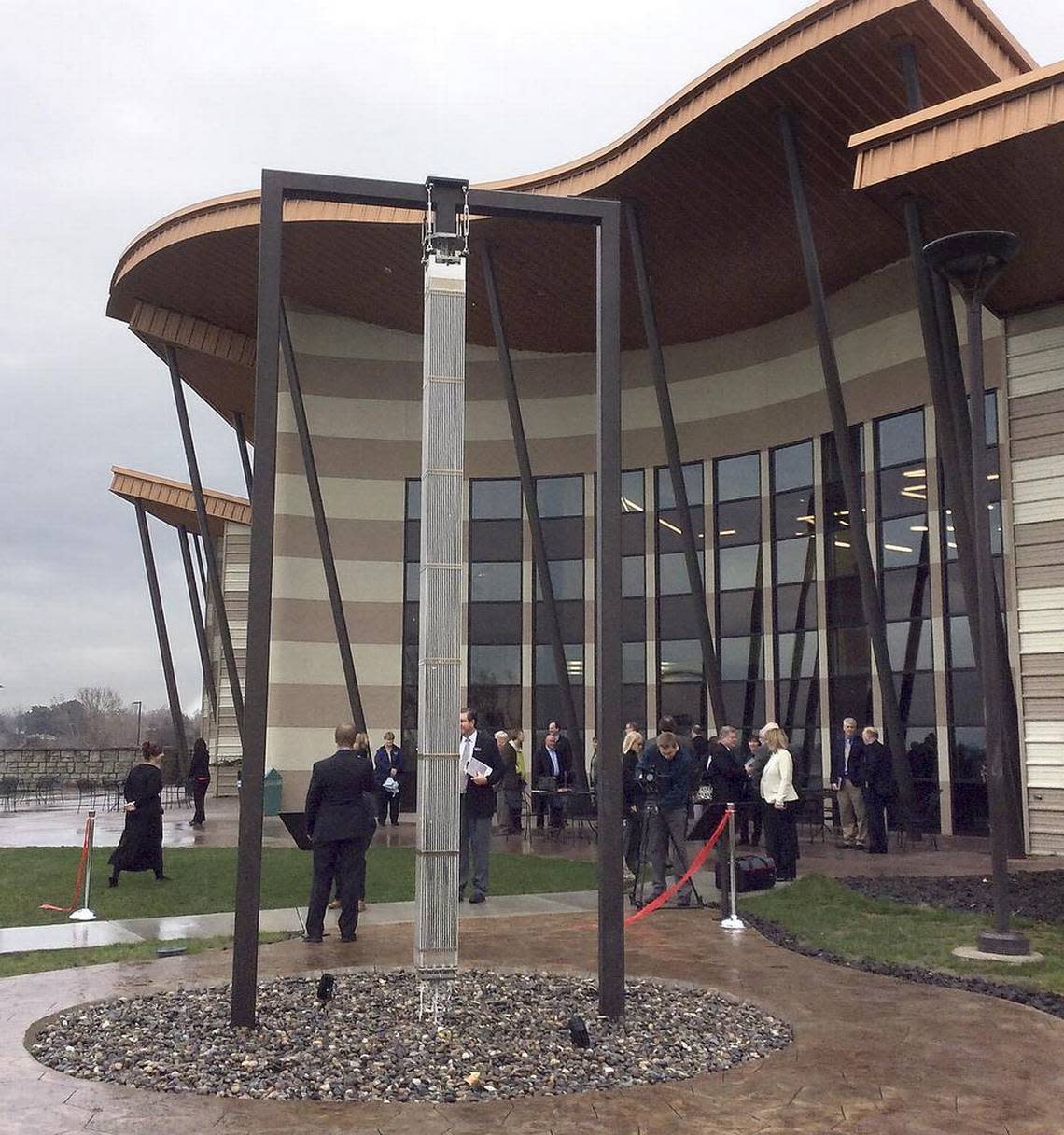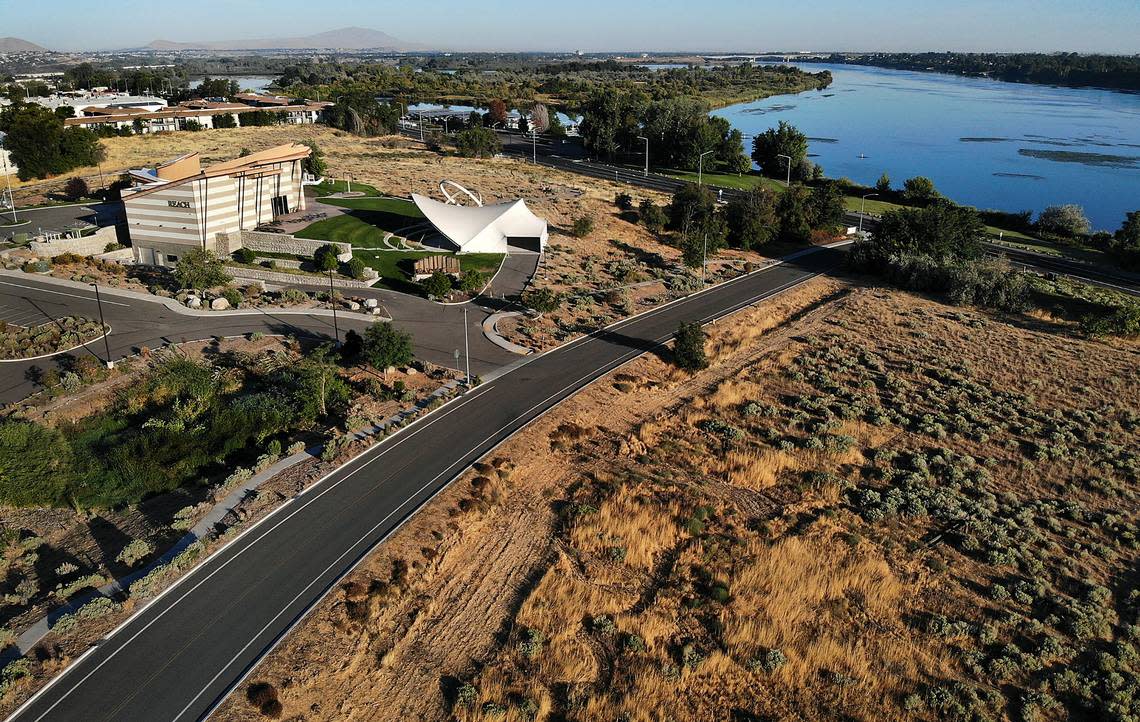New theater could turn Richland into cultural heart of Tri-Cities — if voters OK $81M plan
Picture this: It’s late winter or early spring 2028.
Evening approaches and everyone is dressed for a night out — theater, dinner, the works.
It’s not just any night out. It’s opening night for the Mid-Columbia Performing Arts Center, an $81 million, 800-seat theater next to the Reach Museum, near the Richland Wye.
The dream of a regional performing arts venue could become a reality if Richland voters agree to raise the sales tax by two tenths of a percent, possibly on the Feb. 12, 2025 ballot.
Tri-Citians have talked of a proper performing center for 30 years.
The Arts Center Task Force, a small group of dedicated volunteers, has worked to make it a reality for more than a decade.
It identified property near the Reach Museum, 1943 Columbia Park Trail, as the best location after backing out of a deal to buy 10 acres at Kennewick’s Vista Field in 2020.
Since then, it has worked with the Richland Public Facilities District, the quasi-independent agency that built and oversees the museum, about collaborating on the theater project next door.
The proposal requires public funding to proceed. In Washington, facilities districts can leverage state sales tax revenue and ask voters to raise the local tax to support projects.
The proposed sales tax would account for 80% of the cost to build the performing arts center, with grants and private donations covering the balance.

2 cents on $10 purchase
The district’s board, which is appointed by the Richland City Council, hasn’t formally settled on a February ballot, but will discuss it in October, said Steven Wiley, board president.
Wiley is a PNNL biologist who served on the Arts Center Task Force before he stepped down to join the public facilities board.
The proposal would ask Richland voters to raise the local sales tax by 0.2%, or two cents on a $10 purchase. It would generate $4+ million a year and would end after 30 years.
If approved, construction could begin by 2027 and the glassy theater would open a year later, overlooking Bateman Island and the Columbia River.
Wiley and PFD board members Michael Wiemers and Doug McMakin briefed the Richland council about its plans in August. The district relies on the city for administrative support, but is mostly independent.
The decision to place the measure on the ballot rests with the board, which would fund the cost from its own resources.

Nevertheless, city council members voiced wariness.
Mayor Theresa Richardson, who was absent, sent a written statement celebrating the arts, but questioning the cost at a time “when so many residents are struggling to make ends meet.”
Mayor Pro Tem Sandra Kent, a former president of the Tri-Cities Regional Public Facilities District, said she wanted to hear more about the Richland district’s finances.
“The projects are good,” she said. “The question is whether or not the Richland Public Facilities District is truly ready and able to take on the additional projects.”
The theater would be financially self-sustaining within three years, according to a lengthy feasibility study completed in July.
Ending the tax after 30 years builds in accountability to voters, Wiley said. The facilities district could ask for an extension to support additional projects in the future.
“If we do this right and the facilities are sustainable, as time goes on, we can build other facilities,” Wiley said.

Tricky history
The Washington Legislature authorized cities, towns metro areas and counties to create public facilities districts to promote economic development by giving them a resource to finance, design, construct, remodel, maintain or operate public facilities — typically theaters, sports arenas, museums and aquatics centers.
The public facilities district in Spokane is a notable success, responsible for five popular venues: Spokane Arena, Convention Center, First Interstate Center, The Podium and One Spokane Stadium.
For Wiley and the Richland district board, Spokane is a model of using a facilities district to create venues citizens want.
“Public facilities districts should enhance the community. Richland has an opportunity,” he said.
Kennewick, Richland and Pasco each has its own facilities district. The Tri-Cities Regional district covers the three cities but is mostly inactive.
Tri-Citians have not cottoned to the concept, rejecting four of five tax requests to date.
Only one passed, in Pasco, to support the aquatics center starting to take shape in the Broadmoor area.
Kennewick voters rejected three requests to modernize the Three Rivers Convention Center complex, including one that would have installed a 2,000-seat “Broadway” style theater.
The regional district asked Tri-Cities voters to approve an aquatics center a decade ago. It failed.
Wiley believes Richland voters will support the idea if supporters are forthcoming and transparent.
He’s emboldened by results of an April 2024 poll of Richland residents, conducted by Sonar Insights.
Of the 1,405 surveys completed, 65% reported they had no knowledge of the proposed theater. However, 78% said they would vote “yes” on a sales tax measure.
The venue would host hundreds of local and touring performances each year.
It would be the preferred venue for most arts organizations in the region, including Mid-Columbia Ballet, Mid-Columbia Mastersingers, Mid-Columbia Musical Theatre and Mid-Columbia Symphony.
It would have an art gallery, lobby and event space.

Reach Museum
Wiley sees the theater as one of two projects to relaunch the Richland Public Facilities District, which is chiefly associated with building and overseeing the Reach Museum, which opened in 2014.
The district keeps a low profile and has has never asked its voters to raise the local sales tax.
It built the Reach by issuing a $7 million bond, backed by revenue from the 0.033% sales tax rebate all public facilities districts receive from the state. The balance stands at about $2.5 million.
The district’s board is considering refinancing the bond at the full amount to fund a second phase for the museum. The initial 14,000 square feet is too small to host larger displays or the high-profile touring exhibits that draw in new guests.
“No matter what, we need more space. You just can’t do anything with that small space,” he said.
In another big shift, the public facilities board is considering shifting oversight for the museum to a nonprofit, which would be better able to marshal volunteers and donors to fully activate it.
Constructing the project was a herculean task, he said, but it’s time for the district to step back and focus on its facilities-building mission.
Wiley believes that if the performing arts center and museum expansion succeed, it could lead to a cluster of cultural facilities at on the Richland end of Columbia Park.
The “STEAM” — for Science, Technology, Education, Arts, Music — complex could support a children’s museum and other venues in the future.
The Richland Public Facilities Board meets at 5:30 p.m., the third Thursday of each month at the Reach, 1943 Columbia Park Trail.
Agendas are posted on the Richland city website.
The Arts Center Task Force and the facilities district will hold a joint visioning session this fall. Interested participants are asked to complete an application form to be considered.
Sign Up: Boom Town Tri-Cities
Stay up to date on Tri-Cities growth and development with our weekly business newsletter. Get the latest on restaurant and business openings and closings, plus the region’s top housing and employment news. Click here to sign up. In your inbox every Wednesday.





